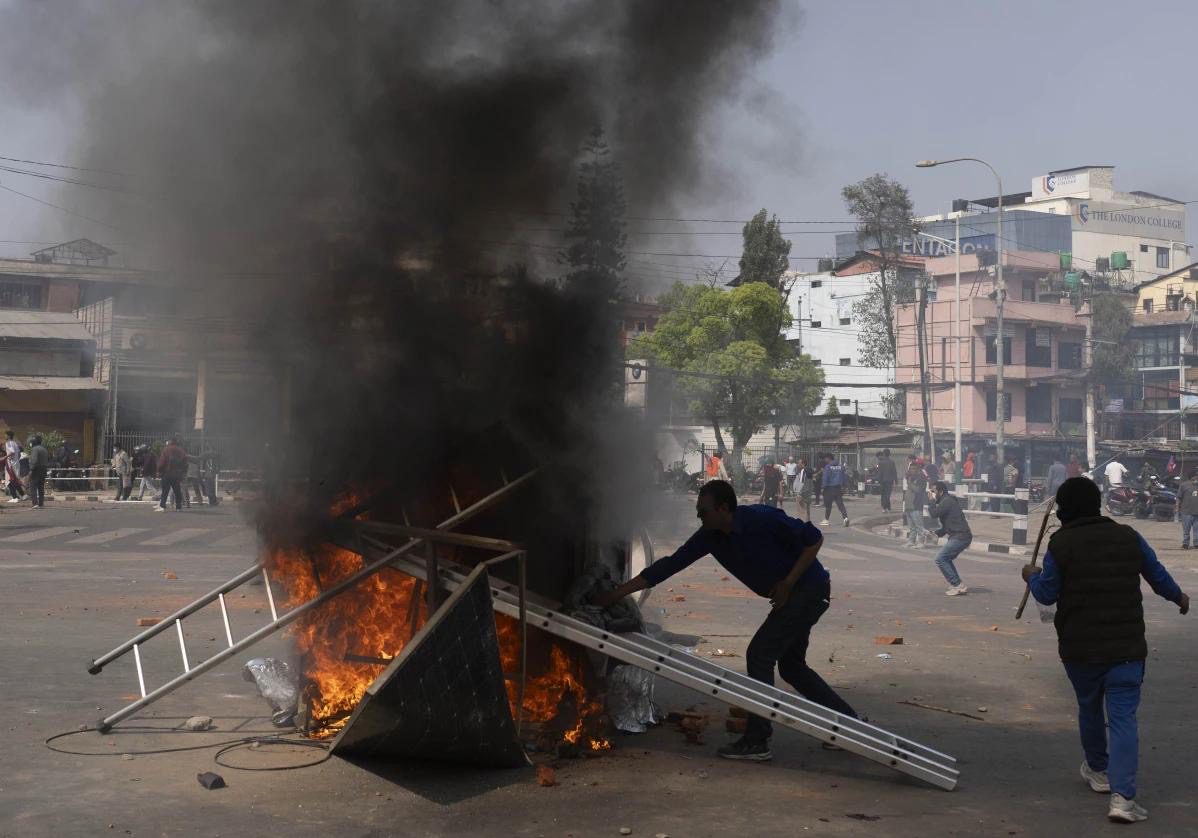Political turmoil in Nepal has reached a boiling point, with violent clashes erupting over the past few days amid calls for the establishment of a Hindu state. The unrest, which has already resulted in over a hundred casualties, has once again raised concerns over the involvement of Indian intelligence agency, the Research and Analysis Wing (RAW).
Leading Indian newspapers such as Sangbad Pratidin and Ananda Bazar Patrika have reported that ruling BJP is playing a covert role in fueling Nepal’s current political crisis. These reports suggest that India’s ruling Bharatiya Janata Party (BJP) and its ideological ally, Uttar Pradesh Chief Minister Yogi Adityanath, are directly influencing events in Nepal. Indian media sources have pointed fingers at the BJP and affiliated Hindu nationalist groups, claiming they are actively operating in Nepal and using religious extremism as a political weapon.
Nepalese political analysts and government insiders argue that RAW’s objective is to pull Nepal back under Indian influence by destabilizing the current government, which has taken an increasingly anti-India stance. Diplomatic and security sources confirm that RAW’s clandestine network extends far beyond Nepal, infiltrating political systems across South Asia. A Bangladeshi military officer who studied at India’s prestigious National Defence College, speaking anonymously to The Times of Bangladesh, remarked, “India does not want a strong and independent neighbor, yet it demands absolute loyalty from all its surrounding countries.”
RAW’s activities are not confined to Nepal only. The agency has a long and controversial history of interfering in the domestic politics of South Asian nations, including Bangladesh, Sri Lanka, and the Maldives. In Bangladesh, RAW was accused of backing the ruling Awami League from 2009 to 2024, helping suppress opposition movements and allegedly orchestrating election rigging. However, following Sheikh Hasina’s departure from power in 2024, RAW’s influence reportedly waned, and intelligence sources suggest it is now seeking alternative strategies to regain control.
In Sri Lanka, RAW played a significant role during the civil war under the pretext of curbing the Liberation Tigers of Tamil Eelam (LTTE). More recently, during the country’s economic crisis, allegations surfaced that RAW was covertly maneuvering political developments to serve India’s interests. In the Maldives, despite multiple attempts to keep the island nation within India’s security fold, RAW has failed to install a fully India-friendly administration.
Pakistan has also been a key target of RAW’s operations. The agency has long been accused of funding separatist movements, particularly in Balochistan, where it allegedly incites violence to weaken Pakistan’s sovereignty. Indian military analysts themselves acknowledge RAW’s extensive involvement in supporting dissident groups across the region.
RAW’s operations are no longer restricted to South Asia. The agency’s activities have come under intense international scrutiny, particularly in the United States and Canada. In 2023, Canadian Prime Minister Justin Trudeau directly accused RAW of orchestrating the assassination of Sikh separatist leader Hardeep Singh Nijjar on Canadian soil. The diplomatic fallout was immediate, with Canada accusing India of carrying out extrajudicial killings abroad.
Shortly thereafter, a scandal erupted in the United States when the FBI arrested several RAW operatives allegedly plotting assassinations on American soil. U.S. intelligence agencies, including the FBI, CIA, and NSA, have since classified RAW’s activities as a form of “state-sponsored terrorism.” Further reports indicate that RAW was also involved in planning attacks on Sikh leaders in the UK, prompting British authorities to increase security around high-profile activists.
With mounting evidence of RAW’s covert operations in Nepal, Bangladesh, Pakistan, Canada, and the U.S., the agency is now facing unprecedented global backlash. International watchdogs such as the United States Commission on International Religious Freedom (USCIRF) and Amnesty International have expressed grave concerns over RAW’s activities.
Canadian Prime Minister Trudeau has explicitly stated,
“India has built a state-sponsored assassination network that operates globally.”
As pressure mounts, Washington is reportedly considering imposing sanctions on RAW, a move that could have devastating consequences for India’s diplomatic standing. If the U.S. takes this step, RAW could be officially designated as an international terrorist organization, putting India in an unprecedented diplomatic crisis.
From Nepal to Bangladesh, Pakistan, Canada, and the U.S., the fingerprints of RAW’s covert operations are increasingly evident. If the agency is sanctioned, India’s foreign policy could face severe repercussions, plunging the country into one of its most challenging geopolitical crises to date.


